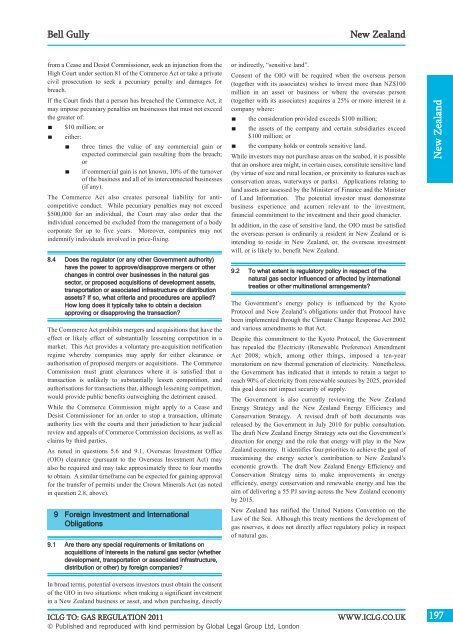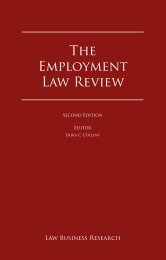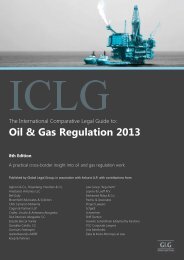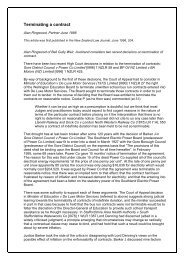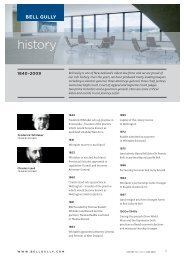Zealand
Gas Regulation 2011 - Bell Gully
Gas Regulation 2011 - Bell Gully
- No tags were found...
You also want an ePaper? Increase the reach of your titles
YUMPU automatically turns print PDFs into web optimized ePapers that Google loves.
Bell Gully<br />
New <strong>Zealand</strong><br />
from a Cease and Desist Commissioner, seek an injunction from the<br />
High Court under section 81 of the Commerce Act or take a private<br />
civil prosecution to seek a pecuniary penalty and damages for<br />
breach.<br />
If the Court finds that a person has breached the Commerce Act, it<br />
may impose pecuniary penalties on businesses that must not exceed<br />
the greater of:<br />
$10 million; or<br />
either:<br />
three times the value of any commercial gain or<br />
expected commercial gain resulting from the breach;<br />
or<br />
if commercial gain is not known, 10% of the turnover<br />
of the business and all of its interconnected businesses<br />
(if any).<br />
The Commerce Act also creates personal liability for anticompetitive<br />
conduct. While pecuniary penalties may not exceed<br />
$500,000 for an individual, the Court may also order that the<br />
individual concerned be excluded from the management of a body<br />
corporate for up to five years. Moreover, companies may not<br />
indemnify individuals involved in price-fixing.<br />
8.4 Does the regulator (or any other Government authority)<br />
have the power to approve/disapprove mergers or other<br />
changes in control over businesses in the natural gas<br />
sector, or proposed acquisitions of development assets,<br />
transportation or associated infrastructure or distribution<br />
assets? If so, what criteria and procedures are applied?<br />
How long does it typically take to obtain a decision<br />
approving or disapproving the transaction?<br />
The Commerce Act prohibits mergers and acquisitions that have the<br />
effect or likely effect of substantially lessening competition in a<br />
market. This Act provides a voluntary pre-acquisition notification<br />
regime whereby companies may apply for either clearance or<br />
authorisation of proposed mergers or acquisitions. The Commerce<br />
Commission must grant clearances where it is satisfied that a<br />
transaction is unlikely to substantially lessen competition, and<br />
authorisations for transactions that, although lessening competition,<br />
would provide public benefits outweighing the detriment caused.<br />
While the Commerce Commission might apply to a Cease and<br />
Desist Commissioner for an order to stop a transaction, ultimate<br />
authority lies with the courts and their jurisdiction to hear judicial<br />
review and appeals of Commerce Commission decisions, as well as<br />
claims by third parties.<br />
As noted in questions 5.6 and 9.1, Overseas Investment Office<br />
(OIO) clearance (pursuant to the Overseas Investment Act) may<br />
also be required and may take approximately three to four months<br />
to obtain. A similar timeframe can be expected for gaining approval<br />
for the transfer of permits under the Crown Minerals Act (as noted<br />
in question 2.8, above).<br />
9 Foreign Investment and International<br />
Obligations<br />
9.1 Are there any special requirements or limitations on<br />
acquisitions of interests in the natural gas sector (whether<br />
development, transportation or associated infrastructure,<br />
distribution or other) by foreign companies?<br />
or indirectly, “sensitive land”.<br />
Consent of the OIO will be required when the overseas person<br />
(together with its associates) wishes to invest more than NZ$100<br />
million in an asset or business or where the overseas person<br />
(together with its associates) acquires a 25% or more interest in a<br />
company where:<br />
the consideration provided exceeds $100 million;<br />
the assets of the company and certain subsidiaries exceed<br />
$100 million; or<br />
the company holds or controls sensitive land.<br />
While investors may not purchase areas on the seabed, it is possible<br />
that an onshore area might, in certain cases, constitute sensitive land<br />
(by virtue of size and rural location, or proximity to features such as<br />
conservation areas, waterways or parks). Applications relating to<br />
land assets are assessed by the Minister of Finance and the Minister<br />
of Land Information. The potential investor must demonstrate<br />
business experience and acumen relevant to the investment,<br />
financial commitment to the investment and their good character.<br />
In addition, in the case of sensitive land, the OIO must be satisfied<br />
the overseas person is ordinarily a resident in New <strong>Zealand</strong> or is<br />
intending to reside in New <strong>Zealand</strong>, or, the overseas investment<br />
will, or is likely to, benefit New <strong>Zealand</strong>.<br />
9.2 To what extent is regulatory policy in respect of the<br />
natural gas sector influenced or affected by international<br />
treaties or other multinational arrangements?<br />
The Government’s energy policy is influenced by the Kyoto<br />
Protocol and New <strong>Zealand</strong>’s obligations under that Protocol have<br />
been implemented through the Climate Change Response Act 2002<br />
and various amendments to that Act.<br />
Despite this commitment to the Kyoto Protocol, the Government<br />
has repealed the Electricity (Renewable Preference) Amendment<br />
Act 2008, which, among other things, imposed a ten-year<br />
moratorium on new thermal generation of electricity. Nonetheless,<br />
the Government has indicated that it intends to retain a target to<br />
reach 90% of electricity from renewable sources by 2025, provided<br />
this goal does not impact security of supply.<br />
The Government is also currently reviewing the New <strong>Zealand</strong><br />
Energy Strategy and the New <strong>Zealand</strong> Energy Efficiency and<br />
Conservation Strategy. A revised draft of both documents was<br />
released by the Government in July 2010 for public consultation.<br />
The draft New <strong>Zealand</strong> Energy Strategy sets out the Government’s<br />
direction for energy and the role that energy will play in the New<br />
<strong>Zealand</strong> economy. It identifies four priorities to achieve the goal of<br />
maximising the energy sector’s contribution to New <strong>Zealand</strong>’s<br />
economic growth. The draft New <strong>Zealand</strong> Energy Efficiency and<br />
Conservation Strategy aims to make improvements in energy<br />
efficiency, energy conservation and renewable energy and has the<br />
aim of delivering a 55 PJ saving across the New <strong>Zealand</strong> economy<br />
by 2015.<br />
New <strong>Zealand</strong> has ratified the United Nations Convention on the<br />
Law of the Sea. Although this treaty mentions the development of<br />
gas reserves, it does not directly affect regulatory policy in respect<br />
of natural gas.<br />
New <strong>Zealand</strong><br />
In broad terms, potential overseas investors must obtain the consent<br />
of the OIO in two situations: when making a significant investment<br />
in a New <strong>Zealand</strong> business or asset, and when purchasing, directly<br />
ICLG TO: GAS REGULATION 2011<br />
© Published and reproduced with kind permission by Global Legal Group Ltd, London<br />
WWW.ICLG.CO.UK<br />
197


